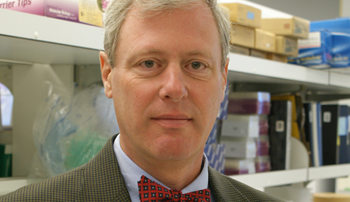A program designed to strengthen the math and science curriculum among American Indian youth in Nebraska and South Dakota will continue thanks to the renewal of the Science Education Partnership Award (SEPA) grant.
 |
Maurice Godfrey, Ph.D. |
Since 2005 when it was initially funded, 130 middle school students and 83 teachers, who teach science on reservation schools, have participated in the program.
“The close ties that we have forged have enabled innovative cooperation for science enrichment among students and teachers,” said Maurice Godfrey, Ph.D., principal investigator on the grant and professor of pediatrics at UNMC.
|
The new grant will be expanded to include high school students, feature two community garden initiatives and a community outreach component through local libraries and a partnership with the McGoogan Library at UNMC.
These initiatives are designed to boost health literacy among community members and engage them in the health sciences, as well as provide access to healthy foods.
“Reaching beyond the classroom to parents and communities is critical to the success of this project,” Dr. Godfrey said. “Advancing the health of Native American communities is the ultimate aim of every aspect of this project.”